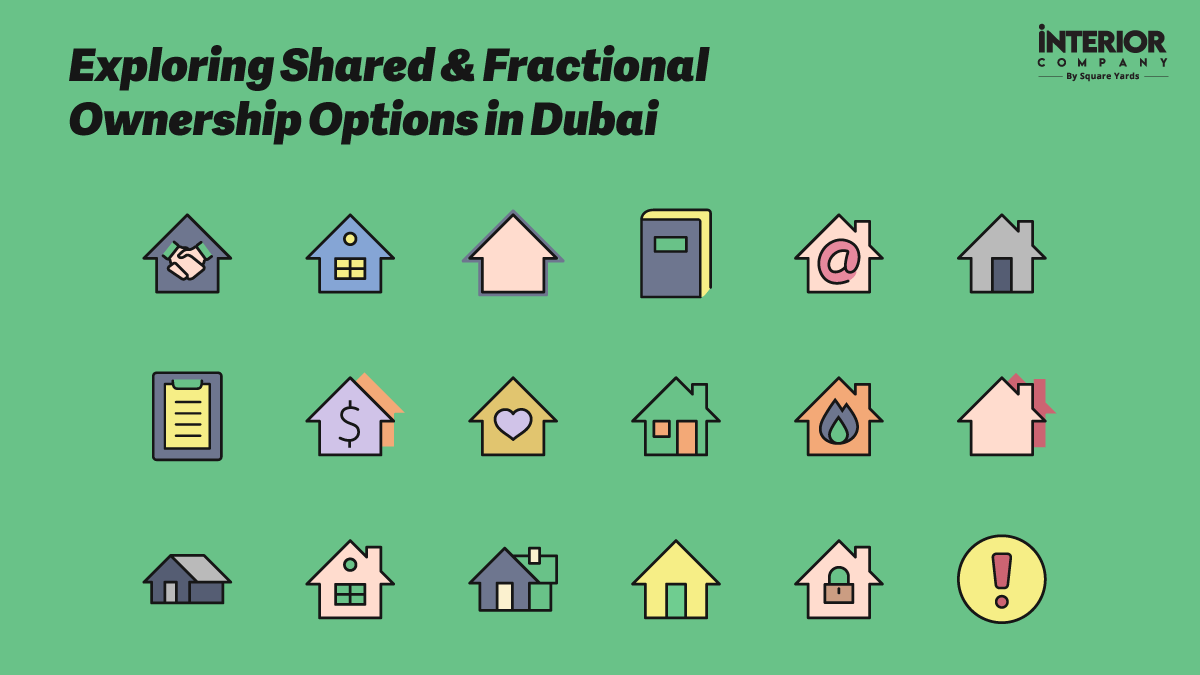This new concept of fractional ownership could be the way for a foreign buyer trying to gain a toehold in Dubai or someone diversifying an investment portfolio to look for high returns. It could open the door to many opportunities in this market. In this guide, we’ll explore fractional ownership, its advantages and disadvantages, the types of available fractional ownership in Dubai, and how to make the most of this innovative investment model.
Fractional home ownership is on the verge of revolutionising real estate investment in Dubai. For investors, it provides an opportunity to invest in luxurious properties they may not be able to afford due to the high costs involved. This concept enables local and international investors to invest in the luxury property market in Dubai without requiring massive capital. Being a relatively new concept, fractional home ownership is already poised to become a precious component in Dubai’s growing real estate market as it expands at an impressive pace.
What Do You Mean By Fractional Ownership in Dubai?

Fractional ownership in Dubai allows multiple investors to purchase and share property ownership. This model provides a more accessible entry point into Dubai’s real estate market, particularly for those who may not have the financial resources to purchase an entire property outright. In a fractional ownership arrangement, each investor owns a percentage of the property and holds a title deed in Dubai reflecting their share. This legal structure ensures that all co-owners have rights and obligations proportional to their investment.
The Real Estate Regulatory Agency (RERA) and the Dubai Land Department (DLD) have implemented regulatory frameworks to support fractional ownership, ensuring the process is transparent and secure for investors. Fractional ownership is available for both new developments and existing properties, provided they meet the necessary criteria set by the authorities. This model stands out from other shared ownership structures, such as timeshares, where buyers only purchase the right to use the property for a specific period each year. In fractional ownership, the investors hold legal title to the property and are entitled to a share of any rental income or capital appreciation that the property generates.
Different Types of Fractional Ownership in Dubai
Dubai offers several options for fractional ownership, each with its own legal and financial implications. Understanding these types can help investors choose the right structure for their needs.
-
Fractional Ownership through an Entity
In this model, a legal entity—such as a limited liability company (LLC)—owns the property, and investors own shares in the entity. The entity holds the title deed, and each investor’s ownership stake is proportional to their share in the company. This structure is commonly used for commercial real estate investments and allows for greater flexibility in managing the property and distributing profits.
-
Tenancy in Common (TIC)
Under the ‘Tenancy in Common’ structure, each investor holds an undivided interest in the property. This means that while the investors collectively own the property, each individual has a distinct share that they can sell, transfer, or mortgage independently. The percentage of ownership can vary among investors, and there is no requirement for all investors to have an equal share. TIC arrangements are popular for residential real estate investments, as they allow for greater flexibility in managing and disposing of individual ownership shares.
Advantages of Fractional Ownership in Dubai
Fractional ownership offers numerous benefits to investors, making it an attractive option for those looking to enter Dubai’s real estate market.
-
Reduced Financial Commitment
One of the most significant advantages of fractional ownership is that it lowers the financial barrier to entry. Investors can buy a share of a property rather than the entire property, making investing in high-value assets with a smaller upfront investment possible. This particularly appeals to investors who want to diversify their real estate portfolio without tying up all their capital in a single property.
-
Diversification of Investment Portfolio
Fractional ownership allows investors to spread their investments across multiple properties. This diversification reduces the risk associated with real estate investments, as the performance of one property does not significantly impact the overall portfolio. By owning fractions of several properties, investors can benefit from the growth and income potential of different sectors within Dubai’s real estate market, such as residential, commercial, and hospitality properties.
-
Prospect for Increased ROI
Dubai’s real estate market is known for its strong rental yields and capital appreciation. Fractional ownership enables investors to benefit from these returns without purchasing an entire property. Fractional owners can enjoy attractive returns with proper market research and strategic investment decisions. In some cases, fractional ownership deals include guaranteed rental returns, making them even more appealing to investors seeking predictable income.
-
Investment Flexibility
Fractional ownership provides greater flexibility in terms of property use and resale. Investors can choose to sell their ownership stake independently without needing the consent of the other co-owners. Unlike timeshares, where the resale market can be more restrictive, this makes it easier to exit the investment if required. Also, some fractional ownership agreements allow investors to enjoy personal use of the property for a set number of days each year, combining investment with lifestyle benefits.
-
Streamlined Management
Managing a property can be challenging for non-local investors. Fractional ownership often includes professional property management services, handling day-to-day operations, maintenance, and tenant relations, allowing investors to enjoy property ownership benefits without the hassle of managing the property themselves.
-
Legal Compliance
Dubai’s government has ensured fractional ownership is a regulated and secure investment model. The Dubai Land Department’s introduction of fractional title deeds ensures that each investor’s ownership is legally recognised, providing peace of mind and protection under the law.
Drawbacks of Partial Ownership in Dubai
While fractional ownership offers many advantages, knowing the potential drawbacks is essential. The following are some:
-
Hard to Get Financial Help
When you buy a fraction of a property, it can be harder to get a loan. Banks and financial institutions are less likely to lend money for fractional ownership because it’s more complicated and involves shared risks.
-
Restricted Flexibility and Liberty
While fraction ownership makes high-value properties more accessible, it also has limitations. Owners must follow shared use schedules and agreements, which could limit their flexibility in using the property. Decision-making about property management and maintenance may need agreement from all co-owners, leading to possible disagreements and taking up time.
Assessing Potential Investments in Partial Ownership

Investing in fractional ownership necessitates thorough deliberation and assessment of potential opportunities. These are some critical aspects when evaluating fractional ownership investments.
-
Analysing Expected Financial Returns
Before investing in fractional ownership, evaluating the potential financial returns is crucial. This includes assessing the expected rental income, capital appreciation, and associated costs, such as maintenance fees and property management charges. Investors should also consider the Internal Rate of Return (IRR) and Return on Investment (ROI) to determine the feasibility of the investment.
-
Understanding High-Performing Submarkets
Location plays a critical role in the success of any real estate investment. In Dubai, certain submarkets, such as Downtown Dubai, Dubai Marina, and Business Bay, are known for their strong rental yields and high demand. Investors should research these areas and focus on properties in high-performing submarkets to maximise their returns.
-
Leveraging Market Data and Expert Analysis
Investors are encouraged to use market data and consult with real estate professionals to make well-informed investment choices. Examining patterns, projections, and past results can offer valuable perspectives on the potential success of fractional ownership investment. Moreover, seeking guidance from real estate experts who focus on fractional ownership can assist investors in navigating the intricacies of this investment approach.
How to Invest in Fractional Real Estate Ownership?
Investing in fractional real estate ownership in Dubai is easy. Here’s a step-by-step guide to help you get started:
Step 1: It’s important to research fractional ownership and become familiar with Dubai’s legal framework. Understand the Dubai Land Department and RERA regulations and requirements to ensure compliance and protect your investment.
Step 2: Clearly define your investment objectives. Are you looking for rental income, capital appreciation, or personal use of the property? Establishing your goals will help guide your investment decisions and ensure you choose the right property and ownership structure.
Step 3: Determine your budget and explore your financing options. Calculate the expected costs of the investment, including the purchase price, maintenance fees, and property management charges. Also, make sure to plan for possible expenses such as repairs or renovations.
Step 4: Selecting the right property is crucial to the success of your investment. Consider location, demand, rental yields, and potential for capital appreciation. Working with a real estate agent specialising in fractional ownership can help you identify properties that align with your investment goals.
Step 5: If you’re entering into a joint ownership agreement, it’s essential to establish clear partnership terms. This includes outlining each investor’s responsibilities, decision-making processes, and exit strategies. A well-drafted legal agreement can help prevent disputes and ensure a smooth investment experience.
Step 6: After investing, checking how the property is doing regularly is important. This means keeping track of how much rent you’re getting, how often the property is occupied, and how much the property is increasing in value. If the investment isn’t meeting your expectations, you may need to change your plan or consider selling your share.
Fractional and Full Real Estate Ownership
When deciding between owning a fraction or the whole of a property, it’s important to understand the key differences. With full ownership, you have complete control over the property and can use and manage it however you want. But it also means you must invest more money and take on more responsibility for managing and maintaining the property. Conversely, with fractional ownership, you can get in with less money and share the management responsibilities. This can be a good option for investors who want access to high-value properties without taking on the full financial burden. However, fractional owners must follow shared use agreements and may have less flexibility in property management.
Outlook for Partial Ownership of Real Estate in Dubai
The future of fractional ownership in Dubai looks promising, with several factors contributing to its growth and success.
-
Market Growth and Regulatory Developments
Dubai’s real estate market continues to grow, driven by increasing demand for flexible investment options. The introduction of fractional ownership title deeds and regulatory support from the Dubai Land Department and RERA is expected to further enhance this investment model’s appeal. As more investors become aware of the benefits of fractional ownership, the market is likely to expand, offering more growth opportunities.
-
Technological Advancements in Real Estate
Emerging technologies such as blockchain and smart contracts are transforming the real estate industry, making transactions more secure and transparent. These innovations are particularly relevant to fractional ownership, as they can streamline the process of buying, selling, and managing fractional ownership shares. As technology advances, fractional ownership is expected to become more accessible and efficient, attracting a broader range of investors.
Key Tips for Investors in Fractional Real Estate in Dubai
For investors considering fractional ownership in Dubai, here are some key tips to keep in mind:
- Consult Real Estate Experts: Seek advice from professionals specialising in fractional ownership. Real estate experts can help you navigate the complexities of the investment model and provide valuable insights into the best opportunities in Dubai’s market.
- Understand Legal Requirements: Familiarise yourself with the legal framework governing fractional ownership in Dubai. This includes understanding foreign ownership laws, tax implications, and the Dubai Land Department and RERA requirements.
- Conduct Market Research: Before investing, thoroughly research the market and identify high-growth areas in Dubai. Focus on properties in submarkets with strong rental yields and capital appreciation potential.
- Diversify Your Investments: Don’t put all your resources into a single property. Diversifying your investments across multiple properties can help mitigate risk and increase your chances of success in Dubai’s real estate market.
- Monitor Market Trends: Stay informed about the latest developments in Dubai’s real estate market. Keeping up with market trends and forecasts will help you make informed decisions and adjust your investment strategy as needed.
Wrapping It Up
Fractional ownership in Dubai presents an exciting opportunity for investors to enter the city’s thriving real estate market with a reduced financial commitment and shared management responsibilities. While there are any challenges, such as limited financing options and shared usage agreements, the potential rewards—particularly in a market as dynamic as Dubai—make fractional ownership an attractive option for savvy investors.
Similar Suggestions For You:
|
Know About Dubai Service Charges |
|
|
Property Transactions with DLD Madmoun Service |
|
|
Everything About Tenancy Renewal Agreement |
|
|
Apply For Housing Construction Grant In Dubai |
|
|
How to Apply For Housing Land in Dubai |
|
|
Know About Gifted Property in Dubai |
|
|
Guide to Dubai Rental Properties |
Frequently Asked Questions (FAQ’s)
Fractional ownership can be worth considering if you're seeking a cost-effective way to invest in high-value assets such as property, yachts, or private jets.
There are primarily two types of fractional ownership structures in Dubai: Real Estate Fractional Ownership: This involves multiple individuals owning portions of a property's title, which is common in residential and commercial real estate. Asset Fractional Ownership: This type is used for personal luxury assets like yachts and private jets, where ownership is divided among several people.
The main disadvantages include: Limited Control: Each owner has restricted control over the property, and decisions must often conform to a management company’s rules or agreements among owners. Resale Challenges: Selling a fractional share can be difficult and time-consuming compared to selling a fully owned property. Potential for Disputes: Conflicts may arise among owners regarding usage, maintenance, and cost-sharing.
One of the benefits of fractional ownership is that it can lead to more magnificent houses or assets at a lower cost because the costs of purchase and maintenance are divided among the owners. It also provides flexibility, especially for vacation properties where owners don't have to worry about year-round maintenance; they can use the property at designated times.
Income taxes are not imposed in Dubai on either individual or company incomes, including capital gains from real estate transactions. Fractional ownership may include additional costs divided among the owners, such as service fees for upkeep, registration fees for ownership changes, and VAT on management services.
Shared or fractional ownership differs significantly from timeshare. While fractional ownership involves actual shares in property ownership, offering equity, timeshare provides only the right to use the property for a specific period each year without equity. Fractional ownership can include a variety of assets and is legally treated as property ownership, complete with deeds and titles. In contrast, a timeshare is more akin to a prepaid vacation plan, with no deed or title to the property. Is fractional ownership worth it?
What are the types of fractional ownership structures in Dubai?
What are the disadvantages of fractional ownership in Dubai?
What are the advantages of fractional ownership in Dubai?
What are the tax implications of shared or fractional ownership?
How does shared or fractional ownership differ from timeshare?




